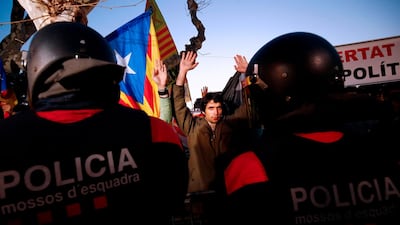Disagreements in Catalonia's pro-independence bloc burst into the open on Tuesday after the Spanish region's parliamentary speaker postponed a vote to reappoint president Carles Puigdemont.
Roger Torrent, who like Mr Puigdemont is pro-independence but belongs to another party, announced at the last minute that he had delayed the parliamentary session to ensure it could later go ahead in an "effective" way after Spain's constitutional court ruled against it.
Mr Puigdemont, calling for unity, insisted that only he could lead Catalonia.
“There is no other possible candidate, no other combination arithmetically possible,” in the regional parliament where separatists hold a majority of the seats, he said in a video posted on social media.
Mr Torrent vowed that his colleague – who is in self-imposed exile in Belgium and has been picked to lead Catalonia again after pro-independence parties won a majority in December elections – would be reinstated.
But while welcomed by the central government in Madrid, the decision drew angry protests from Mr Puigdemont’s Together for Catalonia grouping and the CUP, another smaller, more radical separatist party.
They wanted “to hold the plenary session today, we’re here, we will be here all afternoon, we will be here as long as is necessary, there are people in the streets, we have the votes”, said Elsa Artadi, spokeswoman for Together for Catalonia.
As hundreds of protesters gathered outside the regional parliament in Barcelona, some of them wearing masks of Mr Puigdemont’s face, CUP spokesman Carles Riera called for “a new period of mobilisation and civil disobedience”.
An attempt by some demonstrators to move closer to the assembly led to scuffles with police.
Mr Puigdemont, who left for Belgium shortly after he was removed from office by a Spanish court over Catalonia's independence declaration in October, faces arrest if he returns to Spain for leading moves towards self-government for the divided northeastern region.
Catalan lawmakers had been due to formally vote him into office on Tuesday afternoon.
But the central government lodged a complaint with the constitutional court last week, which ruled on Saturday that Mr Puigdemont must be present at the assembly to be chosen as the region’s chief.
This would have been unlikely as he would be arrested on arrival in Spain and would have to ask the judge for permission to attend.
Announcing his decision to postpone the session, Mr Torrent criticised the ruling.
“The Spanish government and the constitutional court are trying to violate the rights of thousands of Catalans who went to the polls on December 21 and we won’t allow that,” he said.
“I won’t propose any other candidate,” he added, putting paid to speculation that separatists might drop Mr Puigdemont and pick another candidate.
The latest episode in the secession saga comes three months after the assembly's declaration of independence on October 27, which triggered Spain's worst political crisis in decades.
Prime Minister Mariano Rajoy moved to stop the move by imposing direct rule on the semi-autonomous region, sacking its government including Mr Puigdemont, dissolving parliament and calling snap elections.
But in a major setback for the central government, pro-independence parties once again won a majority of 70 seats in the 135-seat parliament in the December polls.
Supporters said Mr Puigdemont was given a democratic mandate to be reinstated at the polls. Madrid is opposed to his return to office.
“You can’t be a fugitive living in Brussels and expect to be elected president of a democratic institution,” Mr Rajoy said Tuesday in an interview on Spanish television.
Mr Torrent had risked criminal charges if he disobeyed the constitutional court by going ahead with the parliamentary session on Tuesday.
While two pro-independence parties criticised his decision to postpone it, deposed Catalan vice-president Oriol Junqueras, who like Mr Torrent is from the ERC party but is in jail pending an investigation into his role in the independence drive, welcomed the move.
Mr Junqueras, who was elected as a lawmaker in December elections, thanked Mr Torrent “for guaranteeing the defence of the rights of all democratically elected MPs”, in a message on Twitter.
Spain’s central government, meanwhile, said Mr Torrent’s decision had avoided making a “mockery of our democracy”.
It is unclear what will happen next.
A senior lawmaker with ERC, Joan Tarda, said over the weekend it may be time to “sacrifice” Mr Puigdemont although there is no clear alternative.
But Mr Torrent’s defence of the former Catalan leader makes this unlikely. A stalemate could lead to new elections.

